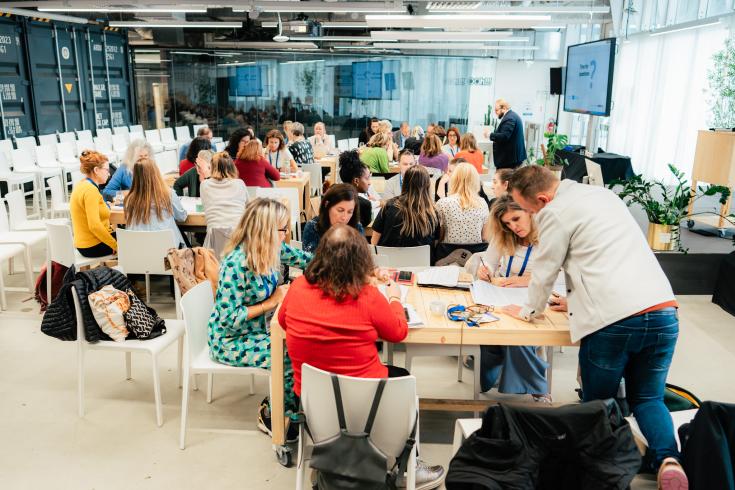Supporting SMEs in adopting and implementing ESG: key learnings

On 22 May, the Policy Learning Platform organised a webinar on support to SMEs in adapting and implementing Environmental, social and governance (ESG). Speakers, including a European Commission representative, addressed the legislative framework and ongoing discussions about the ESG and related directives.
Participants shared their own experiences and questioned the role of public authorities in designing policies that include SMEs specificity.
Webinar agenda
Navigate the webinar agenda below and jump to your topic and question of interest.
00:01:12 : Presentation of Interreg Europe and the Policy Learning Platform by Mart Veliste and Rene Tonnisson
00:13:35 : Presentation by Sven Dietrich on ESG reporting from the European Commission perspective
00:34:46 : Question about the timeline of the Omnibus package presented by the European Commission
00:39:20 : Question about the ongoing discussions about the Green Deal in the European Union
00:45:30 : presentation by Adam Priechodsky on the Autoklastr good practice (AccelerateGDT project)
00:55:00 : Question about ENVIScan role to visit companies for analyses
00:57:05 : Question about controlling ESG to prevent greenwashing
01:00:55 : Presentation by Javier Zubicoa Léon of InnovaRSE (DEBUTING project)
01:14:20 : Question about the rationale behind the launch of the InnovaRSE service
01:16:15 : Question about the unicity of the model in Navarra and whether other regions approached them
01:18:30 : Question about the services to very small businesses
01:20:20 : Roundtable with the speakers about the barrier for SMEs to be really sustainable
01:25:00 : Final remarks by the speakers
Key learnings
Find out the key messages and recommendations delivered by the speakers.
In 2023, the EC launched the new Corporate Sustainability Reporting Directive (CSRD). It is a foundational element of the European Green Deal and with it the EU aims to ensure that companies report comparable and reliable sustainability information to investors and other stakeholders, thus contributing to transparency and accountability.
However, the new directive in 2023 significantly transformed the reporting obligation of enterprises. While the mandatory reporting on “the impact of business activities on people and the environment” was only meant for larger companies of a certain size, there quickly was a reporting trickle down effect to SMEs whereupon large companies started requesting information from their partners in the value chain.
This became challenging for SMEs as often these requests were uncoordinated and in very different formats. The EC therefore mandated EFRAG with the development of a simple, proportionate and harmonised tool for SMEs - the voluntary SME reporting standard (the VSME) - to provide ESG information and to tackle with the increasing requests for sustainability information. The standard also helps SMEs both to monitor their own sustainability performance (as a management tool) and to access new green finance opportunities, by giving them a means to communicate credibly to potential investors.
The main barrier for SMEs since 2023 has been that the ESG framework is too complex which translates into direct costs. Small businesses are unable to hire a dedicated person to be on top of such reporting requirements. Furthermore, while the VSME has been a welcomed development, it has so far not been uniformly accepted as the main reporting standard. Therefore, until there are further simplifications, templates, or standardization in place SMEs will continue to require external support to meet such expectations.
However, 2025 has brought some potentially promising changes for SMEs. In February the EC adopted a simplification omnibus for the CSRD – a package of proposals to simplify EU rules and boost competitiveness. For example, the proposal seeks to increase the importance of the VSME. The VSME would act as a shield for SMEs as larger companies in the scope of the CSRD would not be able to request from companies in their value chain information that goes beyond the information set in the voluntary standard. Furthermore, the proposal suggests to exclude all companies with up to 1000 employees from reporting, which would be a 80% reduction of companies currently under CSRD. Together, these two changes would reduce the sheer number of requests addressed at SMEs and the remaining requests should come in a more standardized manner
However, this regulatory process is very much still in limbo. The omnibus is a proposal of the EC which now is in consultation with the European Council and European Parliament. Nobody knows yet what results will be reached and what the finally agreed amendment to CSRD will look like. An EC recommendation on the VSME under the current CSRD is expected by the end of July 2025, while the overall adaptation of the CSRD omnibus proposals will take effect presumably by Q2 of 2026
Notwithstanding the results of the consultations, the role of public authorities is to help their local SMEs manage the changing regulatory environment and to help them remain competitive within their value chains. Equally, it is up to the public sector to design policies and support frameworks that encourage companies to move towards sustainability as at the end of the day our planet cannot maintain the old way of doing business. Such encouragement needs to go hand-in-hand with support services such as technical advice.
While for some SMEs ESG is perceived as a burden, then for others it is an opportunity. ESGs can be about business strategy and competitive advantage. Successful SME support programmes seeking to emphasize this side of ESG should be aimed at the general management and CEO level, e.g. for those who can implement the change within their organization. Equally important is to highlight the benefits of undertaking such steps – successful cases of other SMEs that have taken on a sustainability journey and have found a competitive edge work the best. Good examples of such SME support programmes are the ENVIScan and InnovaRSE methodologies presented during the webinar.
Presentations
Download the presentations below.
